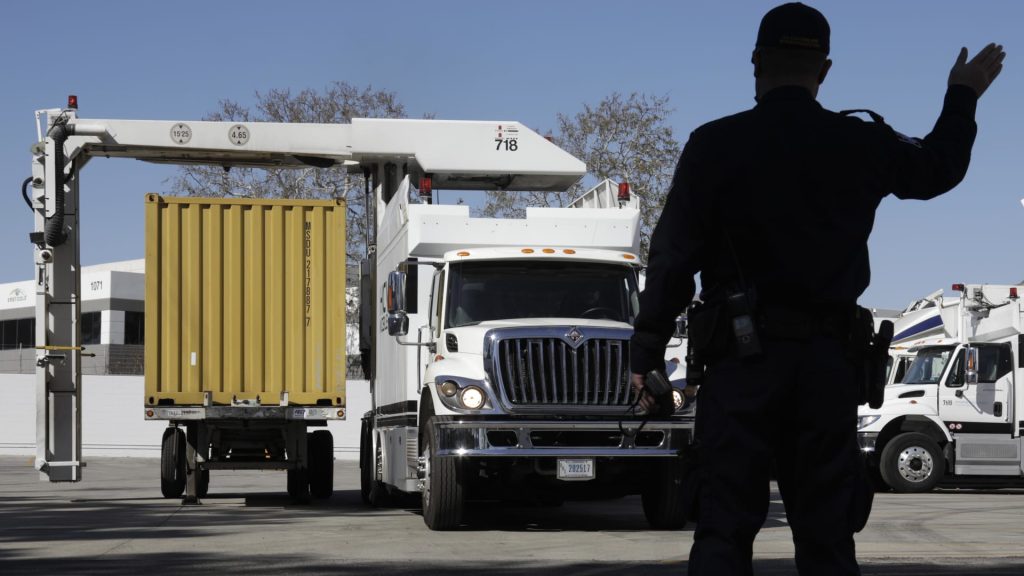Tim Robertson, CEO for DHL Global Forwarding, tells CNBC this is the most atypical peak shipping season he has ever seen.
Traditionally, retailers order their remaining holiday goods for a late August/September arrival before manufacturing plants close to celebrate October’s Golden Week in China. But comparing the holiday freight pulled in this year versus last year, Robertson has witnessed the same freight slowdown noted by many others in the shipping industry.
“Gold Week is a time that marks we are not that far out from Black Friday,” he said. “Volumes into the United States are incredibly soft. This is very different compared to what we have seen in the previous years,” he added.
The trade war has impacted volumes from China to the U.S., with some other Asia to U.S. trade routes experiencing year-over-year declines as high as 20%. Part of the reason behind that is the trade frontloading to get product in ahead of tariffs that created freight surges earlier this year. “Demand impulses over the course of the year have caused stops and starts because of the tariff delays and extensions,” he said.
But Robertson says volumes into other markets are getting stronger, such as Asia-Pacific into Mexico, Brazil, and Colombia, and the same trade uncertainty that is whipsawing freight volumes is also creating new opportunities at the company level to plan for longer-term changes.
“We talk a lot about the golden age of uncertainty, but this is when that divergence in trade, and the volatility, you need to be very quick in identifying trends so that you can make decisions 3, 6, 9 months out,” he said.
DHL is making several changes under its control to adjust the business for the new trade and economic reality. For starters, it is hiring more than 200 customs agents due to the increase in shipping complexity, and to help customers simplify the import process and ensure compliance for small and medium-sized importers.
“Now more than ever, importers require trusted experts to ensure they not only have full end-to-end visibility of where their products are but also to ensure full compliance with the changing regulations and at the same time, landed costs on a real-time basis,” he said. “The customs space is a service offering now that I’m super excited about and you’re going to hear more about that as we continue to invest, recruit, and ramp up in that space,” he said.
Investments are being made across DHL divisions: DHL Supply Chain, DHL Express, DHL Global Forwarding, and for its e-commerce business.
“You’ll see and hear a lot more about the facilities that we’re building out, and investments that we’re making in those three specific markets,” he said.
The customs hiring is going to increase the capacity within its global forwarding division by close to 40%, according to Robertson.
“If you think about the complexity of what we’re dealing with, the tariff rates and the duty rates changing here on an almost daily basis, it’s the experienced operators that can really navigate through that,” he said.
DHL does have an existing onboarding, training and development programs to allow entry-level workers in these kinds of roles to be rapidly upskilled, and ultimately have the opportunity to become customs brokers. But Robertson said in many cases today there is the need for experienced individuals, given the current situation. “This is an area where we continue to need industry solutions to have more experienced customs agents, that’s for sure,” he said. “There really is a a shortage of talent in that space,” he added.
The DHL investments are broader in scope than just customs-related hiring, with Robertson seeing major shifts in sectors benefiting from reshoring, which will result in a dynamic trade landscape. Among the sectors which DHL is targeting: life sciences, pharmaceuticals and health care more broadly.
“Pharma continues to be a big growth area for us,” he said. “We’ve recently invested in a number of acquisitions here in the North American market.”
The Trump administration has been threatening aggressive tariffs on overseas pharmaceuticals and drug companies are bringing more manufacturing to the U.S., with Eli Lilly announcing a $5 billion investment this week, the first in what the company says will be $27 billion in new manufacturing plants in the U.S.
While the Trump administration has made clear that its energy policy is being designed to promote domestic fossil fuels growth while limiting wind, solar and EV development, Robertson says electrification of the grid, battery storage, and EVs are among energy plays seen as a growth driver for DHL investments. But the energy sector focus does dovetail with one priority of the Trump administration: domestic AI innovation and the energy needed to support AI operations. Recent Wells Fargo’s supply chain financing data shows an increase in interest from suppliers within the data center space as it experiences a boom.
DHL is investing in services to support the AI infrastructure boom while also increasing AI technology usage within its DHL Trade Connect platform.
“We see positive momentum in the rapid build-out of data centers, cloud logistics, and cloud space to support the AI transformation, which is creating a lot of opportunities for us,” Robertson said.


